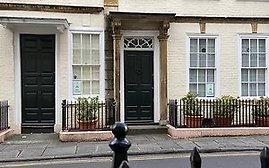An individual approach to ADHD, AuDHD, Dyslexia and other neurodiversities
Many people who are diagnosed or identify as being neurodivergent (ND) have had quite a journey before reaching my therapy and coaching practice. The medical model has been the dominant way of looking at many issues (particularly for what we now call ADHD and ADD) and it has been able to help a proportion of people with a number of medications. However, for many people with NDs the medical model has also become part of the problem and has often failed to provide the sorts of help, inputs and answers that are being looked for (read the Space Race to Ritalin.)
“Neurodiversity isn’t bad, it’s not a sickness, it’s the trauma of living in a world that won’t accommodate us that makes us sick” Rory Tregaskis
The medical model is reductive and potentially only offers limited ways in which you can develop your understanding of your neurotype. Although it is fair to say that the medical model is making some movement towards an understanding that one size doesn't fit all.
I feel fortunate through professional, family and personal experiences to have established a modern, open-minded and progressive approach to working with neurodiversity, especially ADHD, AuDHD and ADD at my central Bristol and online practices.
My main approach to this work often incorporates a coaching framework - where we work transparently and openly alongside each other - helping you to develop your own knowledge and skills. I find, on the whole, people greatly prefer this coaching model to being 'treated' by an 'expert'. I also draw from my long experience as a therapist combining elements from psychodynamic, humanistic and cognitive frameworks of therapy.
Past experience and interest in working with neurodiversities
I have worked with, and have an interest in, neurodivergent people of all ages in various settings. This has included:
- students at the University of Cambridge
- male and female offenders in a Home Office secure unit
- group and individual sessions with young people in primary and secondary school settings
- groupwork with ADHD boys and girls in special education settings
- being a specialist mentor for the Associated Board of the Royal Schools of Music in the area of special education
- having a particular interest and experience of working with later life diagnosis of ADHD and women with ADHD/AuDHD (who are often underdiagnosed in comparison to men).
- founding Attention Allies: Therapists for ADHD
Neurodivergence - it's personal
As well as my professional background in working with those who have dyslexia, ADHD, ASD and other neurodiveristies, I also have experience of neurodivergent family members. Growing up, my own issues with dyslexia (dysorthographia) remained undiagnosed until I undertook my undergraduate degree in psychology, philosophy and education.
Resources
The Adult ADHD Self-Report Scale (ASRS) in the link in this text consists of the eighteen criteria used for establishing ADHD in the Diagnostic and Statistical Manual version 4, text revision (DSM IV-TR). According to the ASRS, six of the eighteen questions were found to be the most predictive of symptoms consistent with ADHD. These six questions form Part A of the Symptom Checklist. Part B of the Symptom Checklist contains the remaining twelve questions. Click the link that follows to view the The Adult ADHD Self-Report Scale (ASRS-v1.1).
Note: Something that people find useful when filling in this symptom checklist is to complete it twice. First, complete it as your natural, uncompensated self (sometimes I call this your child self), and then as your compensated or adult self. This helps you to gain an insight to changes that have happened over time. Whether you might currently meet the criteria for ADHD or not, having a neurodivergent brain isn't something you grow out of - it's a style of being and one that develops and changes over time.
Procrastination and ADHD: The Basics. Procrastination isn’t laziness; it’s often a neurological struggle with motivation, memory, time and emotion. In this short practical guide, I unpack the hidden mechanisms of ADHD procrastination and share how therapy and coaching might help you to navigate each one. From task initiation to emotional overwhelm, this article offers insight and direction for those living with ADHD and the people who support them. Click to read on the Attention Allies blog site.
RSD (Rejection Sensitive Dysphoria). While RSD isn't yet formally recognised or constitute a formal diagnosis, it’s a term that resonates deeply within the ADHD community. By focusing on autonomy, competence and relatedness (the three basic psychological needs outlined in self-determination theory (SDT)) we can begin to build resilience against the intense emotional pain of RSD. Click to read this article on Attention Allies: therapists for ADHD blog site.
Interested in booking sessions?
Please note that I currently have quite a long wait time for new people coming into my practices. I next anticipate being able to offer initial appointments in March 2026. Please email me through the address on my Contacts page or use the form in the side bar (appears below when viewed on phones) if you are interested in working together.
Attention Allies: therapists for ADHD You can read them here.
I am the founder of Attention Allies, a Bristol-based network and community of qualified and experienced therapists who offer online, in room, outdoor and blended counselling, psychotherapy and coaching to people who are diagnosed with or identify as having an ADHD profile. You can find us at: https://attention-allies.org/ and you can read the blog site here.

